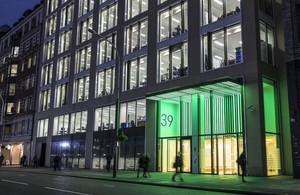Ending the use of sexual violence in conflict
Thank you, Mr President, and thank you to our briefers for their compelling and informative testimonies. The UK is proud to be a partner in this vital work.
Sexual violence is a feature of conflict in countries around the world.
We are particularly concerned about the credible and widely corroborated reports of rape and sexual violence in Tigray. We urge Ethiopia to work closely with the Office of the Special Representative on Sexual Violence in Conflict to address this.
Caroline Atim’s briefing reminded us, too, of the disproportionate impact of gender-based violence on women and girls in South Sudan. There have been ambitious commitments but little peace dividend for women and girls in South Sudan. We look to South Sudan to expedite the establishment of the Hybrid Court, and to partner with the UN to deliver justice.
In these and other post-conflict situations, survivors carry the effects of their trauma, while perpetrators most often walk free.
So first, I want to underline the UK’s commitment to tackling sexual violence in conflict. We are the only country with a Prime Minister’s Special Representative on Preventing Sexual Violence in Conflict, with a dedicated team and funding.
Since 2012, we have committed over £48 million to supporting survivors, tackling stigma and reducing impunity, supporting projects across 29 countries.
Second, I want to emphasise, as we’ve heard from our speakers, the importance of a survivor-centred and human rights based approach, which prioritises the rights and needs of survivors. That includes the right to accessible sexual and reproductive healthcare services and access to justice, which take into account the specific needs of victims and survivors living with disabilities, LGBTQI individuals and other at-risk groups.
The UK has committed £1.3 million to the Global Survivors Fund, run by Dr Mukwege, which works to ensure survivors of conflict-related sexual violence have access to reparations and other forms of redress in conflict and post-conflict countries.
In the last year, the UK has also launched two key tools to support survivors.
First, last June, Lord Ahmad, the Prime Minister’s Special Representative, launched the draft Murad Code for global consultations. This is a code of behaviour for those collecting evidence, to respect survivors’ rights, and ensure investigation is safer, more ethical, and more effective.
Second, last November, Lord Ahmad inaugurated the Declaration of Humanity by faith and belief leaders, which calls for the prevention of sexual violence in conflict and denounces the stigma faced by survivors, including by children born of rape.
Finally, alongside supporting survivors, we must do all we can to ensure accountability for the use of sexual violence as a weapon of war. As the SRSG said, zero tolerance cannot have zero consequences.
The recent UN Security Council Resolution 2564 sanctions against Sultan Zabin demonstrated that the international community can and will take action against perpetrators of torture and sexual violence in conflict.
But there is more we can do to strengthen accountability for these crimes in UN-supported international and hybrid criminal courts and tribunals so that perpetrators are justly prosecuted.
As we’ve heard, there are millions today who are affected by conflict-related sexual violence – survivors, children born of sexual violence, families, entire communities. I thank the Presidency for convening this debate and our briefers for highlighting the problem and what can be done. I assure you of our continuing support to end the use of sexual violence in conflict and as a weapon of war.
Thank you.


